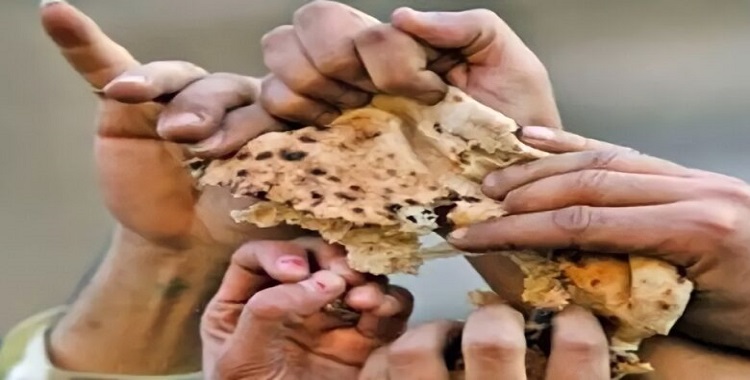Bread Price Increasing, Causing Stir in Iran’s Regime

Written by
Mansoureh Galestan
What goes around comes around, and now Ebrahim Raisi’s government should meet the consequences of playing with currency rates. As prices of basic foodstuff skyrocket in Iran, regime officials warn about people’s reactions and a looming uprising.
On May 5, the prices of bread and pasta, two food items that the public in Iran could still afford to have, suddenly skyrocketed. Many economists and regime officials attribute the rise to the removal of the “preferential rate” used to import grain.
According to the state-run Bahar news on May 5, the price of rice has “increased by 130% in the past eight months.”
People from all walks of life have called for protests, and in Khuzestan, locals took to the streets. The internet in Khuzestan is brought to very slow, and security forces are on alert. The current situation has caused a lot of stir among the regime’s officials.
“The skyrocketing prices have crushed people. The government had promised to help people by giving them coupons but has failed. The current situation has increased people’s dissatisfaction. I fear this delay could cause people’s protests,” Mostafa Mirsalim, one of the regime’s MPs, said on May 6, as quoted by the state-run Entekhab website.
“The government’s plan to help people in terms of giving coupons and subsidies would allow them to have one-seventh of a bread,” the state-run Tabnak website quoted MP Ehsan Arkani on May 6.
“We have 9 million families under the poverty line. We cannot resolve people’s economic woes by digging our hands deeper into their pockets. We wouldn’t eradicate poverty in this way. We would only increase it,” MP Mohammad Asafri was quoted by the state-run Entekhab website on May 6.
“The prices are soaring, and if this trend continues, the national capital [regime’s security] will be lost,” Solat Mortazavi, Raisi’s executive vice president, said on May 5, as quoted by the official IRNA news agency.
After months of flip-flops, Raisi’s government and the regime’s handpicked parliament approved eliminating the so-called “preferential currency rate,” or the official rate of 42000 rials for a dollar. Hassan Rouhani’s government had introduced the preferential rate in 2016 in a bid to control the fluctuating market and somehow prevent people’s protests as the prices of basic consumer goods were soaring.
The official exchange rate was allocated to importing essential goods such as grain and medicine. The regime’s institutionalized corruption eventually tripled the prices but removing the preferential rate has quadrupled the costs of people’s essential needs.
“The reason for the current unprecedented skyrocketing prices is eliminating the preferential rate by the government and parliament. The government would earn 50,000 trillion rials by removing the official exchange rate of 42000 rials per dollar. This is people’s wealth,” Heshmatollah Falahatpished, a former top MP, acknowledged on May 7 on Twitter. It is worth noting that Falahatpishe was the regime’s envoy to Syria in 2015 and later acknowledged they had given $30 billion to Iran’s backed dictatorship of Bashar-al Assad.
“If the government has reduced the inflation and fixed the currency rate, why are the prices skyrocketing? This is a domestic problem. The mafia has its roots in the government,” Ahmad Alam-ol Hoda, Raisi’s father-in-law and the Supreme Leader’s representative in Khorasan province, said. “These skyrocketing prices endanger people’s lives and our [security],” Raisi’s staunch supporter was quoted by the state-run Aftabnews website on May 6.
“If a nation goes from freedom and prosperity to poverty and misery, it is indeed due to the poor governance and ineptitude of the ruling system. How we dare to call people’s poverty ‘God’s will?’” Mehdi Nasiri, who has close ties with Raisi’s government, expressed anxiety over recent remarks by some regime officials attributing problems to God’s will. “If we continue blaming God, we will see the consequence!” he added, according to the state-run Aftabnews on May 6.
Now, as the prices soar, more officials warn about people’s uprising, which they cannot ignore.
“The overwhelming skyrocketing price of bread, which is people’s main food, would force people to fight for existence, which is dangerous. The president should act before it’s too late,” MP Ahmad Naderi warned on May 6, as quoted by Aftabnews.
“Mr. President, if we fail to manage the economy and inflation, there will be no revolution; we should wait for a revolt. The hungry people’s uprising is more dangerous than the revolution. Let’s think of a solution before it’s too late,” mullah Fazel Meibodi warned Raisi on May 6, as quoted by the state-run Khqbaronline.
But would Raisi be able to prevent an uprising?

